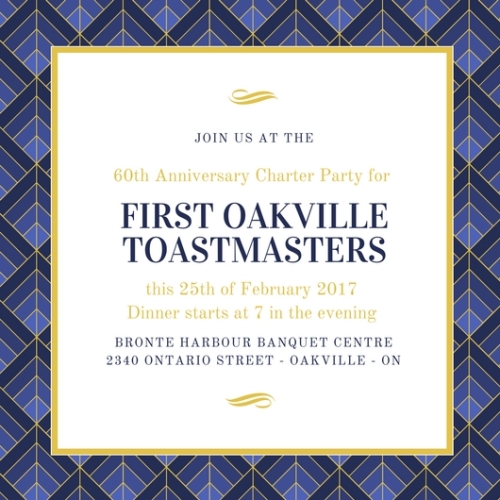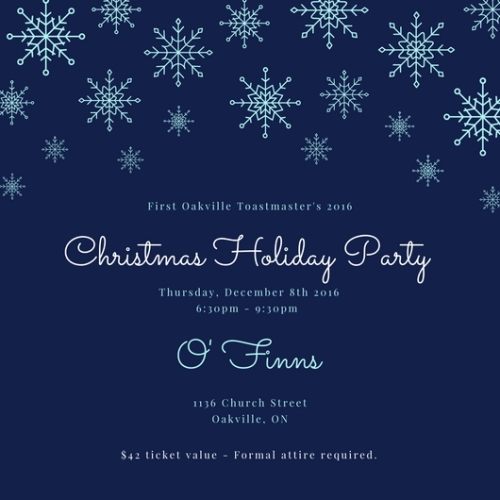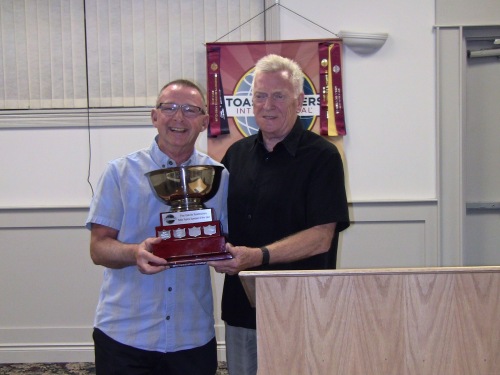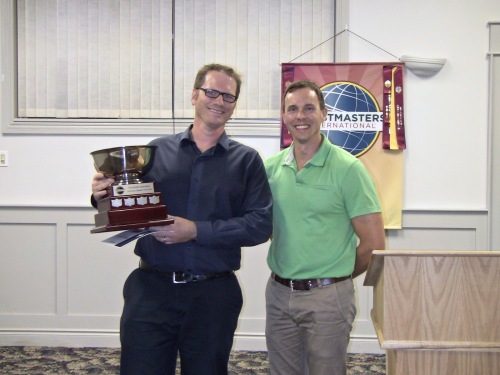Winning an International Speech Contest is actually quite simple. The secret: “Know how the speech is judged and practice, practice, practice!!!”
 In this article, I will cover the judging criteria, how I applied it to my speech, why you should too and other relevant speaking tidbits. I leave the practicing up to you.
In this article, I will cover the judging criteria, how I applied it to my speech, why you should too and other relevant speaking tidbits. I leave the practicing up to you.
In my 22 years with First Oakville Toastmasters, I have competed in three International Speech Contests. In all three instances, I had the privilege of competing at the Area and Division levels. In one case (2005), I competed at the District.
Compared to many at our Club, I compete infrequently when it comes to this particular contest. I don’t recommend that you follow my lead but rather I encourage you to step forward and throw your hat into the ring as often as you can. You have nothing to lose and everything to gain.
In order to compete, you must be a member in good standing of a Club that is in good standing and you must have completed at least six speeches in the Competent Communication Manual prior to the Club contest. Everything you need to win is contained in the first six assignments of the basic manual. It’s helpful to know that you don’t necessarily need to have completed the first six speeches only that you have completed any six out of the 10 speeches from this book.
Picking a Topic
“Condense some daily experience into a glowing symbol and an audience is electrified”
Ralph Waldo Emerson
I always take the sage advice of Emerson when it comes time to pick a topic for the International Speech Contest. In my first speech, I spoke of a homeless man who served as a self-appointed crossing guard in the hometown of my youth. In my second speech, I shared about the trials and tribulations of turning 50. If the subject is not meaningful to me, I will inevitably struggle to make it meaningful to the audience. I learned early on from Loreen Paterick that, if you want to win, your speech must have a message. Any one of your daily experiences can be turned into a speech worthy of a win if you use the information contained in this article.
You have time to pick a topic near and dear to your heart and to write a speech in time for our next contest (January 12). Always remember that “you must speak from your audience’s point of view. They will be motivated only by what they want, not what you want.” Your topic must clearly answer these two questions: “Why this speech; Why this audience?”
The Judging Criteria
“There are three things to aim at in public speaking: First to get into your subject, then to get your subject into yourself, and lastly, to get your subject into your hearers”
Anonymous
Each judge will mark from the Toastmasters International Speech Contest Judge’s Guide and Ballot. All speeches at all levels of the competition will be judged on the following criteria:
- Content
- Delivery
- Language
I used these 3 points to form the structure of my most recent evaluations at the Club and Area levels of the Evaluation Speech Contest. It helps me to reinforce in my own mind what constitutes the basis of a good speech.
1. Content – Getting into your subject
In the mid 1990’s, Peter and I attended the worldwide International Speech Contest in San Diego, California and the winner of that speech spoke about his children and his experience as a father. I was astonished at how a simple and easy-to-follow content could impact his audience and judges so profoundly that he won the coveted title of Toastmasters International Speaker of the Year.

Did you know that 50 per cent of your speech will be judged on content? That percentage is divided among the following:
- Speech Development – 20 %
- Effectiveness – 15%
- Speech Value – 15%
a. Speech Development
The judges of your speech will be looking at the structure, opening, and support material. If you’re not clear on what constitutes a good structure, refer to the third assignment in the basic manual entitled “Organize Your Speech.” Here it states that “organization is really nothing more than clear thinking, a way for you to put your ideas together in an orderly manner.” Why is a structure so important? Without one, your listeners will be left confused, unconvinced. Success comes only when you carefully organize your topic. The structure of a speech consists of:
An Ending – Make it memorable
The key point and purpose of my international speech revolved around a legacy: “the legacy of loving and being loved.” That point became the ending of my speech and it was from here that I began my structure. I started with the ending in mind. The ending is the climax of your speech, the final destination at which you hope to leave your audience. The ending should tie into your opening. It should leave your audience with something to believe, do or think.
Be sure to make it memorable like Diane Quigley. Diane, who was a former member of our Club, spoke on her nut allergy and at the end of her speech she demonstrated the best showmanship that I have seen in a long time. With great force and intent she jammed an epinephrine auto-injector into a grapefruit in order to leave her audience with what to do in the event of an anaphylaxis reaction. Will I remember her ending? You bet! It remains seared in my mind and will go down in Toastmasters history as the “Quigley-ending technique.”
An Opening – Make it attention-getting
The opening of your speech must catch the immediate attention of your audience. Solid openings include a startling question, an appropriate quotation, an illustration or story, all of which should be relevant to the body and purpose of your speech. In my opening, I told you what I am going to tell you. I said, “Tonight I’m going to tell you a story about two men, two seemingly inconsequential men …” The audience knows immediately what my speech is about and I hope they will listen attentively to see what the body brings.
A Body – Make it support your purpose
Assignment three of the basic manual suggests that the body of your speech contain information that supports your purpose. Remember to select only one aspect of your topic or purpose otherwise you will run out of time and potentially confuse your audience. I would divide that one aspect into three key points that you wish to share with your audience. The body of my speech reads like a story. I like stories because they appeal to the little kid in me and I suspect that this is true for my audience as well. “A speech should not just be a sharing of information, but a sharing of yourself” so says Ralph Archbold. Inject the body of your speech with something personal. It will give your speech meaning and will answer to my way of thinking one of the key questions: “Why this speech?”
b. Effectiveness
In this area of the judging form, your judges will be looking for achievement of purpose, interest and audience reception. Assignment six of the basic manual makes reference to vividness. “Use words that are alive – words conveying mental images that will stick in the minds of your listeners.” This assignment suggests the more examples, stories, word pictures, action words and words of feeling that you use, the more vivid your talk will be, and the more effectively you will communicate. This technique will increase your audience’s reception to your speech and ideas and will heighten their interest.
c. Speech Value
Originality of thought, ideas and logic will be judged under speech value for 15 points.
2. Delivery – Getting your subject into your hearers
As I said earlier, I always pick a meaningful topic to me. Why? Because it fires me up and makes it so much easier to “get my subject into my hearers.” Johann Wolfgang Von Goethe says ‘It is delivery that makes the orator’s success’. To me, it is the delivery that makes your content sparkle and your words sing. You might be the best writer in the world but if your words fall flat your judges will mark you accordingly.
Did you know that 30 per cent of your speech will be judged on its delivery? This percentage is divided among the following:
- Physical – 10%
- Voice – 10%
- Manner – 10%
a. Physical
In this area, you will be judged on your appearance and body language. Wear your Sunday best so to speak and choose clothes that make you look and feel comfortable. It will make a difference to your confidence and how you will be seen and judged by others.

The physical becomes critical when competing at the District level of this speech competition. The room is huge, housing over 200 people and the stage is expansive. You will lose points if you don’t act “big”. This is where I struggle as it is not my nature to be demonstrative. The winner at the District and my competition was very outgoing. She had big gestures and actually stood up on a chair waving her arms frantically in order to make her point. Secretly and without sounding too much like a sore loser, I thought it looked silly (probably because I was uncomfortable with her mannerisms), but clearly the judges were not. Hand gestures and body language should be appropriate to the speaking space. Staying planted in one spot is perfectly appropriate if the space warrants it, such as at Club level.
b. Voice
Your volume and flexibility (vocal variety) will be scrutinized. Assignment five of the basic manual speaks eloquently on vocal variety and its importance. It states that “we are five times as likely to be influenced by voice than by spoken words as we listen to the speaker. Thus, we are more influenced by how a speaker talks than by what a speaker says.” When delivering your speech be conscious of your volume, pitch, rate and quality. They can enhance, distract or adversely affect your speech.
c. Manner
Were you direct, assured and enthusiastic? You better be because you could earn up to 10 points under this category.
3. Language
In all three of my International Speeches I borrowed the language and words of others just as I am doing throughout this article. Quotes support and enforce your purpose but be sure to give credit where credit is due because the rules of the contest clearly state that any quoted material must be so identified during the speech presentation. In my International Speech, I often use a quote because in my opinion it gives credibility to what I am saying and to let my audience know that others think and believe as I do. My speech reads, “The words of George Moore resonate with me. He says and I quote ‘man travels the world over in search of what he needs but returns home to find it.’” There are a lot of great sites on the internet that will help you pick a quote that is suitable to your speech and its purpose. I use http://www.great-quotes.com/.
Did you know that 15 per cent of your speech will be judged on its language? This percentage is divided between the following:
- Appropriateness – 10%
- Correctness – 10%
a. Appropriateness
Is your language appropriate to your speech purpose and to your audience? Assignment six in the basic manual touches on this point. This assignment states that “speeches are clearest when short and simple sentences are used. Spoken language is much less formal than written language and tends to be repetitious.” Throughout the body of my speech, I repeated phrases and used short sentences to make my ideas clear. This was the first time I actually focused on employing this technique. I felt that I was talking to my audience rather than at them, which was my experience in previous speech contests.
b. Correctness
Your judges will be listening to your grammar, word pronunciation, and word selection.
Timing
The rules read – “Speeches will be five to seven minutes. A contestant will be disqualified from the contest if the speech is less than four minutes 30 seconds or more than seven minutes 30 seconds.” If your speech goes over this time allotment, you will lose! Even if everything else is perfect, you will be disqualified. Prior to announcing results, the Chairman will announce if time disqualification(s) occurred, but not name the contestant(s) involved. This is why at our regular meetings a speaker over time will not win the best speaker ribbon. Speech timing is learned and is best perfected at regular Club meetings.

The total word count in my speech is 825 words (71 for the opening; 693 for the body; 61 for the ending). The red light flashed at the exact point I concluded my speech. Remember to be cognizant of pauses as they are critical to your delivery but they will invariably extend your speech timing. You should be wrapping up your speech not long after you see the yellow light otherwise you risk watching all your hard work go for naught.
What happens if you win the District competition?
For our Club, there are six levels associated with the International Speech Contest. They are:
- Club (the top four winners will be chosen to move to the next level)
- Charter Party *
- Area
- Division
- District
- International
* so far as I know, we are the only Club with this extra level of competition
 Typically, you will use the same speech at the first five levels of the competition. Please note the rules state that you are not required to do so. Some of you may recall that Hal Shaw changed his speech during the competition. This is within the rules and is acceptable.
Typically, you will use the same speech at the first five levels of the competition. Please note the rules state that you are not required to do so. Some of you may recall that Hal Shaw changed his speech during the competition. This is within the rules and is acceptable.
If you should happen to win at the District level you will move onto the International level of the competition. This is when the competition gets interesting. That great speech which has served you so well from the Club through to the District must be set aside for a new one.
So if you are serious about becoming the next Toastmasters International Speaker of the Year, you will need to deliver two different winning speeches. Those that are serious, have two speeches ready to go even as early as the Club level of the competition.
Summary
Below I reiterate the points made in this article in order to help you win:
- Finish six manual speeches from the Competent Communication Manual
- Pay your dues
- Participate because you can’t win sitting on the sidelines
- Pick a topic meaningful to you as delivery will inevitably come naturally
- Identify the purpose of your speech and clearly know: “Why this speech? Why this audience?”
- Ensure your speech has an easily understood message
- Plot out the structure starting with the ending first
- Grab your audience’s attention with a strong opening
- Share yourself in the speech body making sure its content supports your purpose
- Your speech ending should leave your audience with something to believe, do or think. Remember the “Quigley-ending technique”
- Use words that are alive; words that convey mental images that stick with the audience
- Be original and logic in order to increase your point count under speech value
- Wear your Sunday best for confidence
- When delivering your speech, be conscious of volume, pitch, rate and quality
- Be direct, assured and enthusiastic to enhance your delivery
- Use a quote for credibility
- Use short, simple sentences and repeat phrases for clarity
- Watch grammar, word pronunciation and word selection
- Be within time
- Memorize your speech, but not perfectly so that it does not come off stiff and unnatural
- Practice, practice, practice.
Follow these, and you too can join the list of current members whose names proudly adorn the First Oakville George McVitty Trophy Speaker of the Year. They are:
- Aman Kapur
- Hal Shaw
- Mark Molder
- Marion West
- Peter West
Keep the judging criteria in the back of your mind as you write your speech and you too could be a winner!

 Too many reasons to celebrate and to be proud of, including our and our nation’s anniversaries.
Too many reasons to celebrate and to be proud of, including our and our nation’s anniversaries.



 I was a newbie 2 years ago. As I reflect on the past 2 years somehow it feels like I have been a
I was a newbie 2 years ago. As I reflect on the past 2 years somehow it feels like I have been a  In this article, I will cover the judging criteria, how I applied it to my speech, why you should too and other relevant speaking tidbits. I leave the practicing up to you.
In this article, I will cover the judging criteria, how I applied it to my speech, why you should too and other relevant speaking tidbits. I leave the practicing up to you.


 Typically, you will use the same speech at the first five levels of the competition. Please note the rules state that you are not required to do so. Some of you may recall that Hal Shaw changed his speech during the competition. This is within the rules and is acceptable.
Typically, you will use the same speech at the first five levels of the competition. Please note the rules state that you are not required to do so. Some of you may recall that Hal Shaw changed his speech during the competition. This is within the rules and is acceptable.









